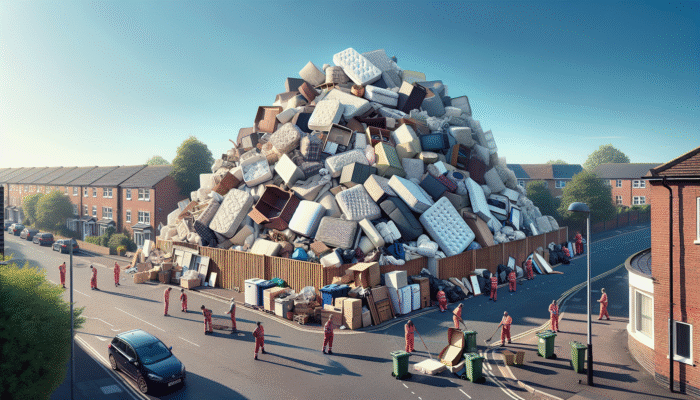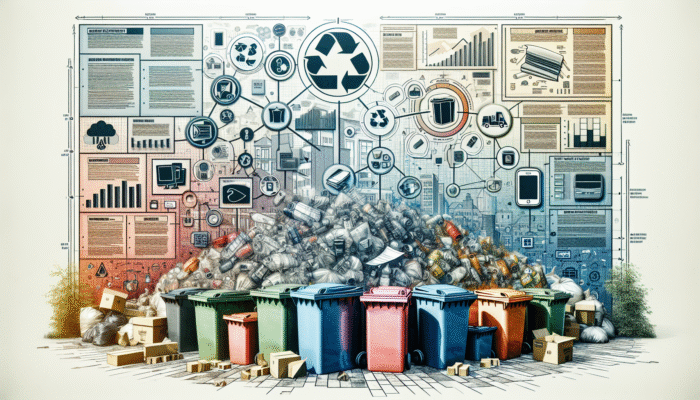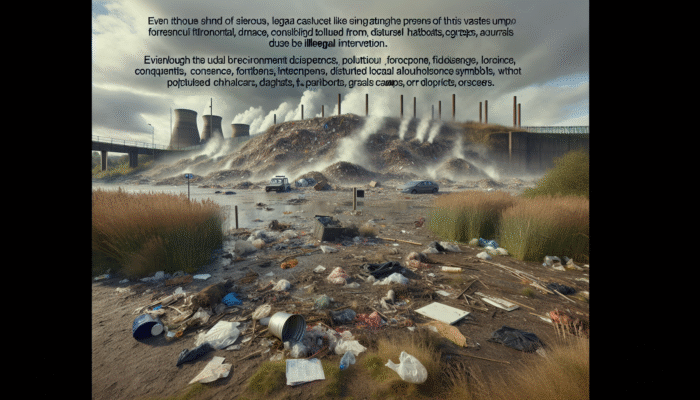Ultimate Guide to Effective Bulky Waste Management Strategies in the UK
Understanding Bulky Waste: Essential Characteristics and Environmental Consequences

Bulky waste encompasses large items that cannot be discarded through standard household waste bins due to their size and weight. This category includes oversized furniture pieces, large kitchen appliances, and items like mattresses. In the UK, understanding the definition of bulky waste is crucial as local councils enforce specific regulations regarding its collection and proper disposal. By identifying which items qualify as bulky waste, residents can manage their waste more effectively, aiding not only in personal organisation but also contributing to the broader objective of sustainable waste management. This knowledge empowers individuals to take proactive measures to prevent these items from harming the environment or exacerbating its degradation.
Recognising the defining characteristics of bulky waste allows individuals to make informed choices about their disposal options. Rather than simply discarding these items, residents can explore alternative methods for recycling or reusing, which significantly alleviates the burden on landfill sites. The classification of bulky waste includes a diverse range of products, prompting households to remain vigilant about what constitutes such items. This awareness enables them to identify appropriate disposal methods that comply with environmental standards and regulations, thereby ensuring responsible waste management practices are consistently followed.
Identifying Common Bulky Items in UK Homes: Key Items to Watch For
A multitude of bulky items typically resides in UK households, including sofas, armchairs, fridges, washing machines, and large televisions. These substantial items not only occupy considerable space but also tend to be cumbersome to transport, necessitating special handling during their disposal. Most households will encounter bulky waste periodically, whether due to general decluttering, moving to a new home, or the natural deterioration of items over time.
Sofas and armchairs are particularly prevalent, as families often seek new furniture to better meet their changing needs or keep abreast of evolving design trends. Similarly, household appliances like fridges and washing machines have limited lifespans and require replacement once they become outdated or cease functioning. With the rapid evolution of technology, older televisions are frequently discarded in favour of modern counterparts. By understanding the common types of bulky items typically found in homes, residents can make better-informed decisions regarding disposal options, thus facilitating effective recycling efforts and minimising their environmental impact.
The Importance of Recycling Bulky Waste for Environmental Sustainability
The significance of recycling bulky waste is paramount, particularly concerning environmental conservation. Proper disposal of these large items can dramatically diminish the quantity of waste directed to landfills, thereby reducing the emission of harmful greenhouse gases into the atmosphere. Recycling bulky items allows for the recovery of valuable materials, positively impacting the manufacturing process and lessening the demand for new resources, which is essential for sustainable development.
Furthermore, engaging in the recycling of bulky waste contributes to nurturing a sustainable ecosystem. Resources like metal, wood, and plastic can be repurposed, conserving both natural resources and energy. This recycling initiative is pivotal in mitigating waste while fostering a culture of sustainability within communities. Actively participating in recycling bulky items during house clearances reflects our collective duty to protect the planet for future generations.
Insights into UK Legislation Governing Bulky Waste Disposal

Understanding the Waste Framework Directive: A Basis for Sustainable Waste Management
The Waste Framework Directive constitutes a key piece of legislation that governs waste management practices throughout the UK, providing a comprehensive framework for the sustainable treatment of waste, including bulky items. This directive advocates for waste prevention, recycling, and recovery, ensuring that waste treatment is conducted in an environmentally responsible manner. Under this directive, the UK aims to reduce its dependency on landfills and improve recycling rates, which directly influences the management of bulky waste across the country.
This legislation requires member states to implement measures that promote waste recycling and recovery, with the goal of improving resource efficiency. The focus on recycling bulky items aligns with broader European objectives aimed at fostering a circular economy, where materials are reused, and waste generation is minimised. By comprehending the implications of the Waste Framework Directive, residents in the UK can become more aware of their waste management obligations and the legal frameworks that dictate waste disposal, guiding their actions toward compliance and sustainability.
Understanding Local Authority Regulations: Customised Approaches to Bulky Waste Management
Local authorities in the UK play a critical role in managing bulky waste disposal. Each council has its unique regulations and services tailored to address the specific needs of its community. Some councils provide complimentary collection services for bulky items, while others may impose a fee for this service. The procedures for scheduling a collection can vary considerably; for instance, some councils require appointments to be made online or via telephone, while others might offer drop-off facilities for residents.
Local authorities are responsible for ensuring that bulky waste is disposed of correctly and legally, which includes promoting recycling initiatives. Many councils offer comprehensive information on how to recycle specific items, contributing to educational campaigns that raise awareness about responsible disposal practices. By familiarising themselves with these regulations, households can fully utilise the services available from their local councils, promoting compliance while reducing the amount of waste directed to landfills.
The Dangers of Illegal Dumping: Legal Consequences and Community Repercussions

Participating in the illegal dumping of bulky waste is a serious offence in the UK, attracting hefty fines and potential legal consequences. Local authorities have the authority to impose penalties for littering or disposing of waste in unauthorised areas, highlighting the necessity of following proper disposal practices. This legislation aims to safeguard both the environment and public health, ensuring that waste is managed safely and responsibly.
The financial ramifications of illegal dumping can be severe, as councils may impose escalating fines for repeated violations, leading to considerable expenses for individuals or businesses involved. Additionally, illegal dumping exacerbates environmental degradation and negatively impacts local communities. Awareness of these penalties serves as a strong deterrent, encouraging individuals to utilise legal disposal methods for bulky items and engage in responsible recycling practices that benefit both the community and the environment.
National Waste Management Plans: Strategic Frameworks for Responsible Waste Management
The UK government has developed National Waste Management Plans to comprehensively address waste challenges, including targeted strategies for bulky waste items. These plans outline objectives and methodologies for waste management nationwide, aiming to enhance recycling rates and reduce reliance on landfills. By establishing clear targets, the government fosters a commitment to sustainable practices among local authorities and the general public.
These management plans typically include guidelines for the collection, recycling, and disposal of bulky waste, ensuring that adequate resources and infrastructure are established to support effective waste management. They also stress the importance of collaboration among authorities, businesses, and communities in achieving waste reduction goals. By understanding these plans, residents can empower themselves to take an active role in waste management, contributing positively to a sustainable future.
Investigating Practical Recycling Options for Bulky Items in the UK
Leveraging Local Council Collection Services for Responsible Bulky Waste Disposal
Local councils across the UK offer invaluable services for the collection of bulky items, making responsible disposal accessible for residents. Many councils provide complimentary collection services, while others may charge a minimal fee. The specifics of these services, including scheduling and item eligibility, can differ significantly from one council to another, making it essential for residents to consult their local authority for the most accurate and relevant information.
These collection services not only facilitate responsible disposal of bulky items but often incorporate recycling initiatives as well. Once collected, bulky waste may be transported to specialised facilities where it undergoes sorting, recycling, or environmentally friendly disposal. By utilising these services, residents contribute to the overarching objective of minimising landfill waste and fostering a sustainable environment for future generations.
Additionally, local councils frequently run community awareness campaigns that highlight the importance of recycling bulky waste. By engaging in these council-led initiatives, households can play a significant role in local sustainability efforts, reinforcing community spirit and advocating responsible waste management practices among neighbours.
Maximising the Use of Recycling Centres and Tips for Effective Waste Management
Household Waste Recycling Centres (HWRCs) and tips located throughout the UK provide crucial opportunities for recycling bulky items. These facilities accept a wide variety of items, including furniture and appliances, and are equipped to handle large waste efficiently. Many centres require residents to pre-book their visits, which helps manage traffic flow and ensures that facilities are not overwhelmed by high volumes of waste.
At these recycling centres, bulky items are meticulously sorted and processed, allowing various materials to be recycled or repurposed effectively. This careful approach not only conserves resources but also significantly reduces the amount of waste that ultimately ends up in landfills. By utilising local HWRCs, individuals can ensure that their bulky waste is managed in an environmentally responsible manner, substantially contributing to sustainable practices within their communities.
Moreover, recycling centres often provide valuable educational resources regarding recycling and waste management. This information empowers residents to make informed decisions about their waste, fostering a culture of sustainability that benefits the entire community while encouraging responsible consumer behaviours.
Partnering with Private Recycling Companies for Customised Disposal Solutions
In addition to local council services, numerous private recycling companies in the UK specialise in the collection and recycling of bulky items. These enterprises typically offer convenient pick-up services, simplifying the disposal process of large waste for residents. Many of these businesses are committed to environmentally responsible practices, ensuring that items are recycled or repurposed rather than ending up in landfill sites.
Private recycling companies may provide greater flexibility compared to local authorities, including options such as same-day collection or customised service packages tailored to meet individual requirements. This adaptability can be particularly beneficial for businesses, landlords, or individuals undergoing house clearances. By partnering with these companies, residents can ensure that their bulky items are recycled efficiently, thereby supporting both local economies and environmental sustainability goals.
Moreover, many private recycling firms actively promote awareness of the importance of recycling bulky waste. Their initiatives often encompass educational campaigns and collaborations with local governments, enhancing community efforts towards sustainable waste management practices. Choosing to engage with these companies can boost recycling rates and positively influence the environment, reinforcing a collective commitment to responsible waste disposal.
Crucial Steps for Preparing Bulky Items for Recycling
The Importance of Disassembling Furniture in the Recycling Process
When preparing bulky items for recycling, disassembling furniture is an essential step that can significantly enhance the recycling process. Large items like beds and tables can create transportation challenges if they remain intact. Breaking these items down into smaller components facilitates easier handling and processing by collection services, ensuring a smoother recycling experience.
Disassembling furniture not only simplifies logistics but also increases the value of the materials for recyclers. Many components, such as wood, metal, and fabric, possess recycling potential and can be repurposed across various industries. For instance, metal frames can be melted down and reused, while wood may be transformed into new products or utilised for biomass energy. This practice conserves space in landfills and promotes a cycle of reuse that benefits the environment while encouraging sustainable consumer habits.
Moreover, disassembled items can be stored and transported more efficiently, enabling residents to manage their space effectively. Whether preparing for a house clearance or a general declutter, breaking down furniture is a proactive approach that ensures responsible recycling practices are followed, aligning with broader sustainability goals.
Thorough Cleaning and Removal of Hazardous Components: Ensuring Safe Recycling Practices
A critical aspect of preparing bulky items for recycling involves thorough cleaning and the removal of hazardous components. Items like appliances may contain materials that pose environmental risks, such as batteries, refrigerants, or electronic parts. Properly extracting these hazardous components is essential to ensure that the recycling process is both safe and compliant with relevant regulations.
Cleaning bulky items not only enhances their presentation for recycling but significantly increases their chances of reuse. For example, a clean and intact appliance is far more likely to be refurbished and resold than one that is dirty or damaged. By taking the time to clean and remove hazardous materials, individuals contribute to safer recycling practices and improve the likelihood of their items being repurposed effectively, thereby minimising waste.
Furthermore, many recycling facilities have specific guidelines for item preparation, including instructions related to hazardous waste. Familiarising oneself with these guidelines ensures that the recycling process is efficient and that all materials are handled appropriately. This preparation is not merely a responsible practice; it signifies a commitment to environmental stewardship and community wellbeing, underscoring the importance of sustainable waste management.
Optimising the Recycling Process through Labelling and Sorting
Effective labelling and sorting of bulky items can significantly enhance the recycling process. By clearly identifying different materials and components, individuals improve the efficiency of processing at recycling facilities. For instance, separating wood from metal or textiles aids recyclers in managing materials effectively, ensuring that each component is directed to the appropriate recycling stream.
Proper labelling also supports compliance with local regulations, as many councils and recycling centres have specific guidelines regarding how materials should be prepared for collection or drop-off. This organisation can elevate the overall recycling rate within communities, as well-sorted materials are often more likely to be recycled instead of sent to landfill.
Additionally, engaging in the labelling and sorting process cultivates a culture of accountability and responsibility among residents. It encourages individuals to think critically about their waste and the lifecycle of their items, ultimately contributing to a more sustainable approach to waste management. By actively participating in this practice, residents can play a vital role in reducing waste and promoting recycling efforts within their communities, reinforcing the significance of sustainable living.
Maximising Opportunities for Donating and Reusing Bulky Items
Supporting Charitable Organisations and Second-Hand Shops through Generous Donations
One of the most impactful strategies for managing bulky items is donating them to charities and second-hand shops. Numerous organisations across the UK accept donations of furniture, appliances, and other large items, granting them a second life while simultaneously supporting meaningful causes. Charitable organisations often rely on these donations to fund their initiatives, creating a mutually beneficial situation for both donors and recipients.
Donating to charity not only offers individuals a sense of fulfilment but also helps reduce clutter and waste in their homes. For those looking to dispose of items responsibly, this option is often the most compassionate choice available. Charities like the British Heart Foundation or local community shops actively seek donations of bulky items and possess the infrastructure to collect them, simplifying the process for residents.
The environmental benefits are substantial as well. By choosing to donate instead of discarding items, individuals prevent valuable resources from ending up in landfills, conserving energy and reducing their overall carbon footprint. This practice encourages a culture of reuse and sustainability, emphasising the importance of community-oriented waste management initiatives that benefit society as a whole.
Leveraging Online Platforms for the Effective Reuse of Bulky Items
In today’s digital landscape, online platforms like Freecycle and Gumtree have emerged as invaluable tools for the reuse of bulky items. These platforms provide a venue where individuals can list items they no longer need, facilitating connections with people actively seeking those specific items. This practice not only helps divert waste from landfills but also allows valuable items to find new homes where they will be appreciated and utilised.
Engaging with these platforms fosters a sense of community and resource sharing, as neighbours can support one another in their pursuit of sustainable living. Offering items for free can encourage quick take-up, enabling residents to declutter their homes while ensuring that their unwanted items are reused rather than discarded.
Moreover, these platforms often highlight the environmental benefits of reusing items, underscoring the impact of waste and the importance of sustainability. By participating in these online communities, individuals can contribute to a circular economy, where products remain in use for extended periods, thereby decreasing the demand for new resources and the environmental consequences associated with manufacturing processes.
Engaging in Community Reuse Schemes for Efficient Bulky Waste Management
Local community reuse schemes represent an excellent pathway for recycling bulky items, often collaborating with local authorities and charitable organisations. These schemes focus on collecting and redistributing furniture and other bulky items to individuals in need, effectively preventing waste while providing support to vulnerable families and individuals.
These community initiatives can vary in scope but typically involve partnerships with local charities, schools, and civic organisations. By pooling resources, these schemes can efficiently collect and redistribute bulky items, ensuring that they reach those who can benefit from them. Supporting or participating in these initiatives reinforces the importance of community, sustainability, and social responsibility in waste management practices.
Through community reuse schemes, residents can easily offload unwanted bulky items without the environmental guilt associated with sending them to landfills. Such initiatives not only provide practical solutions for waste management but also strengthen community ties, creating a network of support that enhances overall wellbeing. Engaging in these schemes is a proactive step towards cultivating a sustainable and compassionate society that prioritises responsible waste management.
Utilising Local Authority Services for Effective Bulky Waste Collection
Many local councils in the UK offer specific services for collecting bulky waste, simplifying the process for residents to dispose of large items responsibly. Council-led bulky waste collection services often come with a fee, but they provide a convenient method for homeowners to declutter without the hassle of transporting items themselves.
These services are designed to ensure responsible disposal and recycling of bulky items, guaranteeing that they are managed appropriately after collection. Councils typically collaborate with recycling facilities to ensure that items are sorted and processed according to established regulations, promoting a sustainable approach to waste management that aligns with national objectives.
Utilising local authority services not only assists individuals in managing their waste but also contributes to the broader community goal of reducing landfill use and increasing recycling rates. By taking advantage of these services, residents can ensure that their bulky items are recycled effectively, thus supporting local sustainability initiatives while decluttering their homes responsibly.
Collaborating with Furniture Reuse Networks for Community Support
Furniture Reuse Networks across the UK play a pivotal role in collecting and redistributing donated furniture to those in need. These organisations focus on preventing waste while supporting individuals and families who may lack access to essential furniture items. By connecting donors with those in need, these networks promote a culture of reuse and sustainability that benefits the entire community.
The operational model of Furniture Reuse Networks typically involves the collection of donated items, which are then cleaned, refurbished, and distributed to individuals requiring assistance. This process not only supports community members but also reduces the amount of waste that ultimately ends up in landfills, positively contributing to environmental conservation efforts.
Engaging with these networks allows residents to dispose of their bulky items responsibly while making a tangible impact on their community. By donating furniture and other items, individuals can help bridge the gap for those in need, ensuring that essential goods remain accessible to everyone. This approach reinforces the importance of social responsibility in waste management, cultivating a sense of interconnectedness within communities and promoting a sustainable future.
Case Studies Showcasing Successful Bulky Waste Recycling Initiatives
Innovative Furniture Reuse Project in Manchester: A Benchmark for Community Collaboration
In Manchester, a groundbreaking project has been launched to address the issue of bulky waste through effective recycling and redistribution of furniture. This initiative revolves around collecting unwanted furniture from households and refurbishing it for reuse within the community, thereby significantly reducing landfill waste and providing affordable furniture options for those in need, particularly low-income families and individuals.
The success of this initiative is attributed to robust partnerships forged with local charities, community organisations, and dedicated volunteers. By collaborating efficiently, they have established a streamlined process for collecting, refurbishing, and distributing furniture items. Residents are encouraged to donate their unwanted furniture, which is then assessed for quality before being repaired and cleaned as necessary, ensuring that only high-quality items are provided to those in need.
The impact of this programme extends beyond waste reduction; it nurtures community spirit and provides essential resources for those who might otherwise struggle to afford basic furnishings. By showcasing the benefits of recycling bulky items, this initiative serves as a model for other cities across the UK and beyond, inspiring similar projects that promote sustainability and social responsibility.
Appliance Recycling Initiative in London: A Blueprint for Eco-Friendly Practices
In London, an innovative initiative focuses on recycling old appliances, significantly reducing landfill waste while recovering valuable materials. This programme encourages residents to recycle their end-of-life appliances, such as fridges, washing machines, and microwaves, through a network of collection services and recycling centres designed to facilitate responsible disposal.
The initiative highlights the necessity of responsible disposal and recycling of appliances, many of which contain hazardous materials that can adversely impact the environment if not managed correctly. By promoting public awareness and providing convenient collection options, the initiative has successfully diverted thousands of appliances from ending up in landfills, fostering a culture of sustainability among residents.
Through this programme, valuable materials, including metals and plastics, are recovered and reintegrated into the manufacturing process, contributing to the establishment of a circular economy. The positive outcomes of this initiative extend beyond waste reduction; it also encourages London residents to critically evaluate their consumption and disposal habits, ultimately promoting a more responsible and eco-conscious community.
Successful Mattress Recycling Programme in Birmingham: A Case Study in Innovation
Birmingham’s mattress recycling programme serves as an exemplary model for effectively managing bulky waste. The initiative focuses on dismantling old mattresses into their component parts, such as springs, fabric, and foam, which can then be recycled or reused. Given that mattresses often present significant challenges for recycling due to their size and composition, this project represents a substantial advancement in waste management efforts.
The programme operates by offering dedicated collection services for old mattresses, ensuring they are transported to specialised recycling facilities. Here, the mattresses are systematically dismantled, allowing various materials to be processed and transformed into new products. This method not only prevents mattresses from being discarded in landfills but also significantly contributes to resource conservation and sustainability.
The success of Birmingham’s mattress recycling initiative demonstrates the potential for effective recycling schemes to manage bulky waste sustainably. By implementing such programmes, cities can markedly reduce environmental impacts while also fostering responsible consumption habits among residents. This case study serves as a blueprint for other cities aiming to tackle the issue of bulky waste creatively and effectively while promoting community involvement.
Raising Public Awareness about the Importance of Bulky Waste Recycling
In addition to these successful case studies, educational initiatives are vital in raising awareness about bulky waste recycling. Cities throughout the UK are investing in campaigns to inform residents about the significance of recycling bulky items and the various options available for responsible disposal.
These educational efforts often encompass workshops, community events, and online resources that explain the recycling process, the benefits of responsible waste management, and the environmental impact of improper disposal. By empowering individuals with knowledge, cities can cultivate a culture of sustainability that encourages residents to actively engage in recycling and reuse behaviours, thereby fostering a more environmentally responsible community.
The ongoing education of the public regarding bulky waste recycling is crucial for the success of these initiatives. As more individuals become aware of their options and the significance of sustainable practices, communities can collaborate to reduce waste and promote a healthier environment for future generations, ensuring a better world for all.
Frequently Asked Questions Regarding Bulky Waste Management
Which items are classified as bulky waste?
Bulky waste includes large items that cannot fit in standard bins, such as furniture, appliances, and mattresses, which require special disposal methods to handle effectively.
What are the approved disposal methods for bulky items in the UK?
Residents can dispose of bulky items through local council collection services, recycling centres, or private recycling companies that specialise in effectively managing bulky waste.
What are the consequences for illegally dumping bulky waste?
Yes, illegal dumping of bulky waste can lead to significant fines and potential legal action under UK environmental laws designed to protect public health and the environment from harm.
Is it possible to donate my bulky items instead of discarding them?
Absolutely! Many charities and second-hand shops in the UK welcome donations of bulky items, giving them a second chance while supporting community needs and initiatives.
What benefits does recycling bulky items offer?
Recycling bulky items helps decrease landfill usage, conserves natural resources, and promotes a sustainable environment by reintegrating materials back into the manufacturing cycle, thereby benefiting society as a whole.
How do local councils manage bulky waste collection?
Local councils typically provide collection services that may be free or chargeable, ensuring that collected items are either recycled or disposed of in an environmentally responsible manner that complies with regulations.
What steps should I take to prepare bulky furniture for recycling?
Before recycling bulky furniture, it’s advisable to disassemble it if possible, clean it thoroughly, and remove any hazardous components to ensure safe and effective recycling practices.
What online platforms can I utilise to give away bulky items?
Websites such as Freecycle and Gumtree allow residents to donate or sell bulky items, promoting reuse within the community while effectively reducing waste.
Are there community reuse schemes available in the UK for bulky items?
Yes, many local areas have established community reuse schemes that collect and redistribute bulky items to individuals in need, often in collaboration with charitable organisations to maximise impact.
How does Birmingham’s mattress recycling programme function?
Birmingham’s mattress recycling programme collects old mattresses and dismantles them into reusable components, successfully preventing them from contributing to landfill waste while fostering sustainability efforts.
Join the Discussion on Facebook!
The Article: Recycling Bulky Items in House Clearance: A UK Guide Was First Found At https://birminghamhouseclearance.com
The Article Recycling Bulky Items: Your UK House Clearance Guide Was Found On https://limitsofstrategy.com
References:
Recycling Bulky Items: A Guide for House Clearance in the UK




It’s interesting to consider how bulky waste management is not just about individual responsibility, but also about community engagement. Many of us have bulky items sitting unused in our homes, and the idea of recycling or repurposing them can foster a sense of community. For example, organizing local swap events or donation drives allows people to give a second life to furniture or appliances instead of letting them contribute to landfill waste.